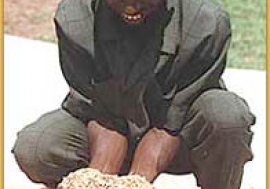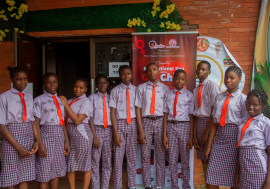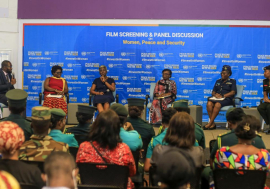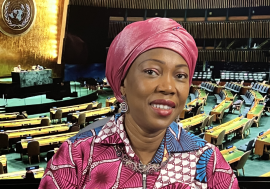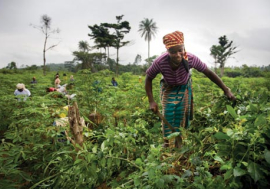Conflict resources: from ‘curse’ to blessing
Conflict resources: from ‘curse’ to blessing
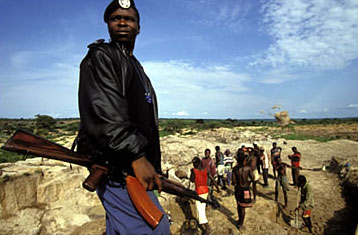 uard at an illegal diamond mine in Angola during the country’s civil war. How can such resources be turned towards peace and development?
uard at an illegal diamond mine in Angola during the country’s civil war. How can such resources be turned towards peace and development?For years, Nigeria’s oil-rich southern delta region has been the scene of repeated armed clashes among local residents, dissident groups and the military and police. The fighting has claimed many lives and sporadically disrupted the country’s main export sector.
The unrest has been stoked by popular frustrations over poverty, pollution and heavy-handed security tactics. The area’s “vast oil wealth has barely touched people’s lives,” noted the UN Development Programme (UNDP) in a July 2006 report on human development in the Niger Delta.
Many local residents believe that the government, military and foreign oil companies are not doing nearly enough to correct this situation. “People know that they will not be allowed to enjoy the benefits of our oil unless they fight,” one rebel leader in Warri told an investigator for the International Crisis Group, a non-governmental research and advocacy organization based in Brussels.
The same month the UNDP released its report, more than 1,000 kilometres away in the town of Gaoua in Burkina Faso, about 150 demonstrators armed with cutlasses, clubs and bows and arrows tried to march to a meeting of the newly elected municipal council. Police blocked the march, but a dozen protesters were able to present their grievances to the provincial high commissioner. They demanded that the authorities send police to halt illegal gold mining on a hill considered sacred by the local Lobi community.
Meanwhile, in the northern part of neighbouring Côte d’Ivoire, a rebel faction controls a large open-pit diamond mine in the town of Seguela. It is one of several producing diamonds — estimated to be worth more than $20 mn — that have been smuggled into Mali and Ghana to help fund arms purchases, in violation of UN sanctions.
Breaking the links
As part of their broader efforts to secure peace and development on the continent, Africans and their international partners are focusing increasingly on ways to break the links between conflict and natural wealth. Whether as objects of competition or sources of military financing, notes UN Under-Secretary-General and Special Adviser on Africa Legwaila Joseph Legwaila, natural resources have played a “negative role” in many of Africa’s bloodiest wars, from Sierra Leone and Liberia to Angola and the Democratic Republic of the Congo (DRC).
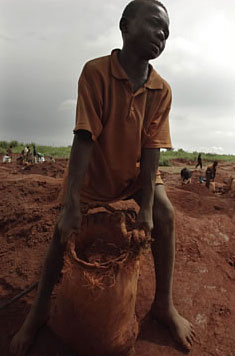 A 13-year-old boy carries a sack of earth and rock at a diamond mine in Mbuji-Mayi, the Congolese “diamond capital”
A 13-year-old boy carries a sack of earth and rock at a diamond mine in Mbuji-Mayi, the Congolese “diamond capital”To highlight the problem, Mr. Legwaila’s Office of the Special Adviser on Africa (OSAA) organized a three-day experts’ group meeting in Cairo, Egypt, in June 2006. The experts — who included representatives of governments, the UN and other regional and international organizations, civil society groups, academics and the private sector — recommended measures to strengthen international and national controls to prevent natural resources from financing warring factions. They also suggested steps to reduce domestic conflicts over access to natural wealth, including “responsible, just and economically productive resource management” by African governments, with “equitable distribution of wealth to all stakeholders, in particular local communities.”
With such an approach, the experts argued, the exploitation of natural resources can be better directed towards improving society as a whole, by reducing competition and transforming natural wealth “from a peace liability to a peace asset.”
The presence of a valuable natural resource is not, by itself, a “curse” destined to incite conflict (see box). Rather, argues University of London lecturer Abiodun Alao, the central issue is how such resources are used and the money they generate is distributed. “The future of the continent,” he wrote in a background paper for the Cairo meeting, “depends largely on how well it manages these resources. Taking a broad look at natural resources and conflict in Africa, it seems obvious that at the centre of most of the problem is governance.”
Cleansing ‘blood diamonds’
There is perhaps no better-known symbol of the link between African resources and conflict than diamonds, evocatively called “blood diamonds.” Because they are small, diamonds can be easily transported and smuggled. The high price they fetch on world markets can buy many arms, pay fighters or otherwise sustain military activities.
In Sierra Leone’s decade-long civil war, the fiercest fighting was over control of that country’s diamond fields. Diamonds smuggled from Sierra Leone also helped finance one side in the war in neighbouring Liberia, as did illegal exploitation of Liberian timber and iron ore. In Angola’s war, each side had a ready source of revenue — the government controlled offshore oil fields, while the rebel UNITA movement sustained itself for years through illegal diamond mining.
Thanks to campaigns by international non-governmental organizations (NGOs) and wide media coverage of the phenomenon, the Kimberley Process was launched in 2000. It is a UN-backed scheme to stop the illegal trading of diamonds and other gems from conflict zones, with scores of diamond-producing and -trading countries now belonging to the initiative. Under the arrangement, all diamond shipments from participating countries must be accompanied by a certificate of authenticity specifying their origin. Experts at the main diamond exchanges in Belgium and elsewhere conduct scientific tests of the diamonds’ composition to try to verify where they came from. Participating countries pledge to punish violators.
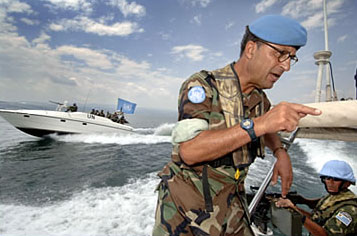 UN peacekeepers patrol against diamond and gold smugglers on Lake Kivu, in the eastern Democratic Republic of the Congo.
UN peacekeepers patrol against diamond and gold smugglers on Lake Kivu, in the eastern Democratic Republic of the Congo.In some countries, the Kimberley Process has had an impact. In Sierra Leone, only a mere $1.2 mn in diamonds was legally exported in 1999, but by 2005 the figure had risen to $140 mn, as the certification scheme encouraged more miners to sell their diamonds to authorized dealers. But the process has major shortcomings. Experts estimate that between $30 mn and $160 mn worth of diamonds are still smuggled out of Sierra Leone annually.
The illegal export of diamonds from northern Côte d’Ivoire is another indication of the limitations. Unless such problems are resolved, warns Global Witness, an advocacy NGO, the Kimberley Process risks becoming “little more than a paper-pushing exercise.” Partly in reaction to the situation in Côte d’Ivoire, a 15 November plenary meeting of the participants in the Kimberley Process agreed to closely monitor all diamond exports from West Africa, with technical information on geological origins required in each shipment out of the region.
One inherent weakness in the Kimberley Process, argues SaferAfrica, a South African NGO, is that it is voluntary, depending on the willing cooperation of governments, companies and diamond dealers. Not all are so willing. Along with other participants in OSAA’s Cairo meeting, SaferAfrica recommended strengthening the ability of governments, NGOs, civil society groups and others to more effectively monitor compliance with the certification scheme and urged governments to penalize and punish violators.
Transparency and ethics
Besides strengthening Kimberley, the OSAA experts’ group proposed that similar schemes be extended beyond diamonds to cover other valuable natural resources. That is beginning to happen, in part thanks to NGO advocacy.
Since 2002, a broad coalition of 300 civil society groups and NGOs has been waging a campaign called Publish What You Pay (PWYP), designed to pressure multinational oil companies to operate more transparently by publicly revealing the details of their oil contracts in Africa and elsewhere. The aim is to make it harder for company or government officials to engage in corrupt acts, a problem that often contributes to domestic political tensions over how oil revenues are allocated.
The NGO Global Witness has specifically highlighted the case of Angola, where some government officials, according to estimates by the International Monetary Fund (IMF), siphoned off $4 bn in oil revenues into private offshore accounts between 1998 and 2002. Since then, the government has requested technical assistance from the World Bank to help it improve transparency in its oil sector.
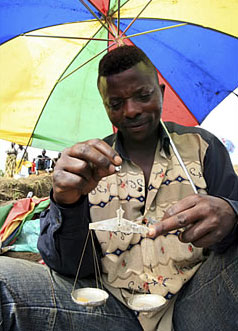 Weighing gold in the eastern Democratic Republic of the Congo.
Weighing gold in the eastern Democratic Republic of the Congo.Not all countries that have formally joined the initiative have actually followed up with practical steps “to prove that they are managing their oil revenues transparently,” notes Mr. Christian Mounzéo, of the coalition’s chapter in the Congo Republic. Besides pressing for full disclosure, he also urges his own government and other African oil producers to establish special oil revenue accounts designed to benefit “future generations,” as Norway has done. Mr. Mounzéo and other PWYP campaigners have suffered legal harassment as a result of their activities.
In 2003, the UK government launched the Extractive Industries Transparency Initiative (EITI), which seeks to improve management of revenues from oil, gas and mining. Primarily, it encourages multinational corporations to be more transparent and accountable in their mining operations. More than 20 countries — 14 of them in Africa — have formally joined the initiative. However, notes Prof. Alao, its success depends “on the willingness of multinational corporations and even incumbents in power to open all the relevant files to public scrutiny.”
Some major companies have pledged to be more open in their dealings, but many remain reluctant, citing competitive pressures, the need for business secrecy and governments’ desire for confidentiality. Moreover, the Cairo experts’ group noted, some mining companies, especially in the extractive industries, show little regard for the social and environmental risks of their operations. The experts urged corporations to implement ethical codes of conduct and the governments of the companies’ home countries to hold them accountable for their practices abroad. African governments were asked to require the companies to develop sustainable development plans to safeguard the environment, provide benefits to local communities and contribute to national development priorities.
State capacities
Even where African governments are willing to better supervise and regulate their countries’ natural wealth, they often are unable to do so very effectively. Especially in countries that are involved in conflict or struggling to recover from war, notes Prof. Alao, there is “a genuine lack of institutional capacity to effectively monitor the vast swaths of territories where natural resources are deposited.” Some resource-rich areas may be near poorly controlled borders, such as the diamond mines in Sierra Leone and Liberia and the mining regions in the eastern DRC. Others are in difficult terrain, as in Nigeria’s swampy Niger Delta.
Moreover, many central governments are unable to fully control the behaviour of their own officials and employees. With large sums of money involved, armed factions and smugglers can often pay off ministers, licensing authorities, customs officers and border guards. During Sierra Leone’s civil war, rebels were frequently able to trade diamonds for weapons from the very government commanders and soldiers who were supposed to be fighting them.
Even in countries at peace, mining, timbering and other extractive activities are difficult to regulate. According to a 2004 study by a research group on African mining at the University of Quebec in Montreal, Canada, the economic austerity policies recommended by the IMF and World Bank in the 1980s and 1990s weakened overall state capacities in many African countries. Although some of those policies have since been modified with the aim of rebuilding state institutions, recent reforms in Africa’s mining and investment codes have conceded so many incentives to mining companies that national governments have little regulatory control and their treasuries and economies derive few benefits. These reforms, noted the researchers, have “tended to favour a weakening of the state’s fiscal basis, its capacity to monitor and enforce, and, consequently, decreased legitimacy and state sovereignty.”
In light of the widespread weaknesses in national institutions, the Cairo experts’ group recommended that the UN, donor agencies and other international institutions provide more aid to African countries to strengthen capacities for natural-resources management. This aid could include training for customs officials and auditors, the establishment of new systems for monitoring extractive industries and support for measures to better combat government corruption and corporate fraud.
In Liberia, the UN’s Food and Agriculture Organization (FAO) has provided technical and financial assistance to help the country develop a forestry policy. During the civil war, indiscriminate logging and illegal smuggling of forest products were used to help fund the conflict, leading the UN Security Council to impose sanctions on Liberian timber exports. A prominent Dutch timber merchant is currently on trial in the Netherlands on charges of buying timber from former President Charles Taylor in exchange for shiploads of arms and ammunition.
“The new forestry policy,” says Mr. Adrian Whiteman, an FAO forestry officer who worked on the project, “aims to maximize the benefits from the forestry sector to the Liberian people and put an end to the use of forest resources to fund conflict. The Liberian Forestry Development Authority is now in a position to regain authority and control over the forest resources.”
Who decides?
Building effective institutions can often take a long time, however. In some countries, donor agencies have been tempted to step in directly to try to quickly overcome problems of corruption and poor administration.
One such initiative involved the construction of the Chad-Cameroon oil pipeline to transport oil from remote fields in southern Chad to a port on Cameroon’s coast. The two governments and the World Bank signed a complex arrangement in which the Bank offered to help fund the pipeline if Chad agreed to allocate the bulk of its oil revenue to specific poverty alleviation and development programmes, through accounts managed by a consortium comprised of government, World Bank and civil society representatives. The scheme was aimed at avoiding a situation in which sudden oil wealth could encourage vast corruption, while the 60 per cent of Chadians who live in poverty see few benefits.
After completion of the pipeline, three major oil companies began producing oil from Chadian wells in 2003. In 2006, the government is expected to earn $200 mn in oil taxes and royalties — more than its entire annual fiscal revenue from all other sources. But the arrangement with the World Bank started to come apart in late 2005 when the government announced its intention to increase the share of oil revenues going directly into the budget, and to use part of it to build up its military to confront domestic rebels and attacks from Sudanese militias across the border in Darfur.
Another donor-initiated scheme was set up in Liberia in 2005. Called the Governance and Economic Management Assistance Programme (GEMAP), it was designed to tackle corruption, fraud and other poor practices under the transitional government set up at the end of the civil war. Under it, external financial managers were brought in to control the customs office, ministry of lands and mining and numerous state enterprises.
Opinion in Liberia is divided. Some have criticized GEMAP as a violation of Liberian sovereignty. Others see it as necessary to help control widespread graft. The new elected government of President Ellen Johnson-Sirleaf, which took office in January 2006, views GEMAP as a useful short-term effort, but emphasizes the need to develop domestic accountability to make external initiatives unnecessary.
The experts’ group meeting convened by OSAA looked at both the Chad pipeline and Liberian initiatives. It proposed that the African Union (AU) strengthen efforts to achieve better national management of natural resources, in part by incorporating specific standards into the African Peer Review Mechanism, through which African countries assess each others’ governance practices. The meeting also urged donors to “respect and support the AU-led process, rather than attempt to impose governance-related conditions for development assistance or supporting externally driven parallel initiatives.”
Notes Mr. John Ohiorhenuan, UNDP’s deputy assistant administrator, even if initiatives such as GEMAP may be necessary because the “plundering has gotten out of hand” and there are no ready alternatives, policymakers should be aware of the danger that such ventures may be a “double-edged sword” that can undermine state sovereignty and foster long-term dependency.
Sharing the wealth
Even if governments are able to manage their natural resources more transparently and effectively, that will have only a limited impact if the benefits are not also shared more widely within African societies. Paradoxically, many areas that have plentiful oil, diamonds or other minerals are also extremely impoverished, from the Niger Delta to Kono, the heart of Sierra Leone’s diamond fields.
Mbuji-Mayi in central DRC is sometimes called the “diamond capital of the world.” But the city itself is little more than a slum. Its province, Kasai Oriental, has high rates of illiteracy and infant mortality, it lacks electricity and 60 per cent of its children under five suffer malnutrition. Meanwhile, a few Congolese and foreign diamond merchants display unimaginable wealth. Such inequities contribute greatly to social and political tensions across Africa, and make it easier for armed groups to mobilize local supporters.
To counter poverty and inequality, the Cairo experts’ group strongly urged African governments and mining and oil companies to ensure that a greater share of natural-resource wealth is used for social services and development programmes nationally, as well as to directly benefit local communities.
In a few cases, the concept of revenue sharing has featured prominently in peace agreements. As part of an accord that ended a long civil war in southern Sudan in 2003, the central government and the rebel Sudan People’s Liberation Army worked out a detailed arrangement in which the two sides would share revenues from oil.
In Nigeria, all 36 states received roughly equal allocations of national oil revenues until 2000, when the share for the oil-producing Niger Delta states was increased to 13 per cent in an effort to allay local grievances. But most of the money went to elites in the cities and some was lost through corruption, so that few poor residents noticed any real improvement. As a result, demands have escalated. The governments of the oil-producing states are now asking that the share be increased to 20–25 per cent, while a government committee proposed in March 2006 that it be raised to 18 per cent.
In an effort to generate some goodwill, foreign oil companies active in the Niger Delta have also directly financed a range of local development projects, from funding health clinics and schools to building public infrastructure and hiring some local workers for their operations. While some communities have benefited, others complain that they are still excluded.
‘Before they blow up’
In 2005, two NGOs (Global Witness and Partnership Africa Canada) joined with two diamond companies (De Beers and the Rapaport Group) to launch the Diamond Development Initiative (DDI). Its aim is to promote better conditions for Africa’s approximately 1 million small-scale artisanal diamond miners, many of whom now earn as little as $1 a day despite their hard and dangerous work.
DDI cites examples from various African countries where programmes are already under way to benefit artisanal miners. In Sierra Leone, the government has established a special tax to boost investments in diamond-producing communities. In the DRC, a public office was established in 2003 to help that country’s hundreds of thousands of artisanal miners better organize themselves, improve safety, acquire new tools and strengthen their power to bargain with diamond merchants. It also allocates 20 per cent of its tax and licence revenues to local community development projects.
Several companies active in Angola’s diamond regions have built schools, rehabilitated health clinics and hospitals, installed hydroelectric power plants and sanitation systems and launched agricultural projects. However, notes a DDI report on Angola, “Government investment — very low in a diamond-producing former war zone — needs to be increased. The expenditures by mining companies are little more than a drop in an ocean of need.”
The International Crisis Group, in an August 2006 report on the conflict in Nigeria’s Niger Delta, noted that the most successful local development projects are those in which communities themselves play an active role. Pro-Natura International (Nigeria), a small NGO with both Delta and foreign staff, pioneered a “participatory” approach in the Akassa kingdom in the oil-producing state of Bayelsa in 1997. Under that approach, the communities identify “micro-projects” costing less than $7,150, such as schools, health centres, skills-training units and micro-credit facilities. Community members provide the necessary land, labour and materials, and the financing comes from oil companies, donor governments, foundations and the European Union. The effort has since been extended to three other kingdoms.
Along with transparency in public and corporate management of natural resources, many more such local development efforts are needed across Africa, says UNDP’s Mr. Ohiorhenuan. Natural wealth need not contribute to conflict, he told Africa Renewal, if African countries initiate “internal dialogue” and deal with various forms of inequity and exclusion “before they blow up in our faces.”
‘Stop blowing the gifts of nature’
When the Cold War ended, there was some initial optimism that armed conflicts in Africa would decline with the absence of the old ideological divides between East and West. While some conflicts did gradually wind down, new ones also erupted, often insurgencies or civil wars among contending political forces within the same country. As a result, not only political analysts but also economic researchers began to look at non-ideological factors, such as ethnic and economic competition.
Some of these researchers, including a team led by Mr. Paul Collier at the World Bank, detected a strong correlation between the outbreak of armed conflict and a country’s dependence on one or two readily exploitable natural resources, such as diamonds, gold or oil. The presence of profitable resources was also seen as a factor in the spread of high-level corruption, a further source of conflict and public resentment.
From this research emerged two broad concepts that were taken up by both policymakers and the media: that the very presence of valuable natural resources often serves as a “curse” that generates conflict, and that insurgent forces frequently are motivated less by genuine grievances than by “greed” for money from the control of natural wealth.
Both explanations have been criticized as simplistic. According to Prof. Wayne Nafziger of Kansas State University in the US, natural resources, by themselves, are not a curse. “Of course,” he adds, “there’s bad stewardship of resources.”
Mr. Rory O’Ferrall, director of external affairs for the De Beers diamond mining group, agrees. At a panel discussion on natural resources in African least developed countries organized by the Office of the Special Adviser for Africa (OSAA) in September, he emphasized that possessing diamonds or other minerals is not a curse. “It all depends on what you do with them.” He cited as an example Botswana, a major African diamond producer, which is a “shining example” of good governance and judicious use of diamond revenues. “Let’s stop blowing the gifts of nature and focus on what we’re doing with them.”
Under-Secretary-General Legwaila Joseph Legwaila, who heads OSAA and is himself from Botswana, made a similar point, adding that “the curse is the people who abuse” natural resources.
Participants in OSAA’s June 2006 experts’ group meeting in Cairo also considered the “greed versus grievance” view of conflict as a distortion. They argued that it tends to overemphasize the influence of natural resources on the behaviour of rebel groups and draws insufficient attention to how poor government management of resources can contribute to conflict and human rights abuses.
Rebels in Sierra Leone and Liberia were widely believed at the time to have been primarily motivated by “greed.” But later investigations by several researchers, including Mr. Paul Richards of Wageningen University in the Netherlands, found that while rebel commanders did benefit from access to diamonds, timber and other natural resources, most young people who joined the rebel ranks were not driven by a desire for the spoils of war. Instead, they sought to oppose abuses by government authorities and traditional chiefs or rebelled in the hopes of altering rural tenure systems that denied them access to land. In both countries, as in Côte d’Ivoire and elsewhere, wrote Mr. Richards in a recent essay, “reform of rural rights seems as urgent an issue as tracking the gun-runners or diamond- and timber-smugglers.”











